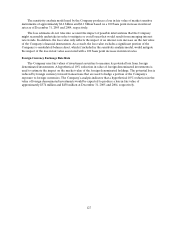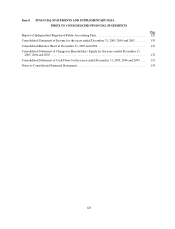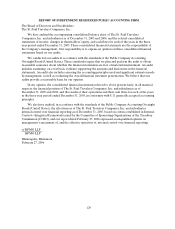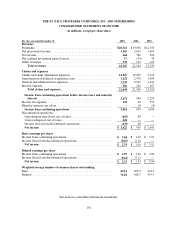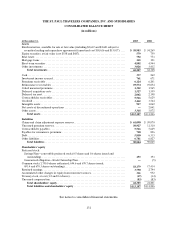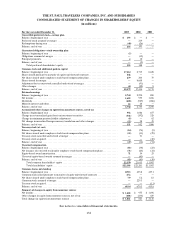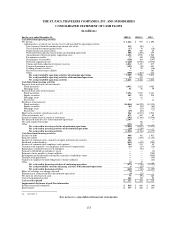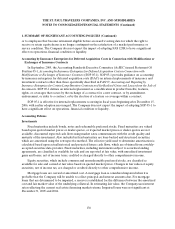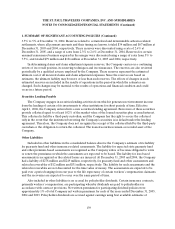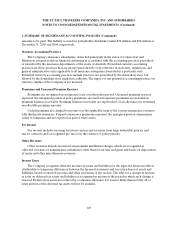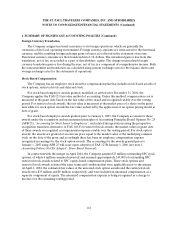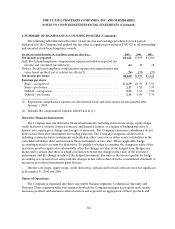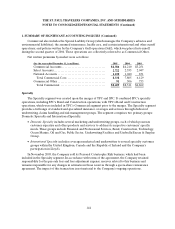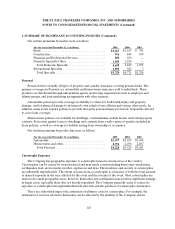Travelers 2005 Annual Report Download - page 147
Download and view the complete annual report
Please find page 147 of the 2005 Travelers annual report below. You can navigate through the pages in the report by either clicking on the pages listed below, or by using the keyword search tool below to find specific information within the annual report.THE ST. PAUL TRAVELERS COMPANIES, INC.AND SUBSIDIARIES
NOTES TO CONSOLIDATED FINANCIAL STATEMENTS (Continued)
135
1. SUMMARY OF SIGNIFICANT ACCOUNTING POLICIES (Cont inued)
Adoption of New Accounting Standards
American Jobs Creation Act—Repatriation of Foreign Earnings
On October 22, 2004, Congress enacted the American Jobs Creation Act (AJCA) which provided a
temporary incentive for U.S. corporations to repatriate earnings previously reinvested in foreign
subsidiaries to obtain an 85% dividends received deduction. In December 2004, FSP No. 109-2, Accounting
and Disclosure Guidance for the Foreign Earnings Repatriation Provision within the American Jobs Creation
Act of 2004 was issued. This FSP provides accounting and disclosure guidance on how to apply FASB
Statement of Financial Accounting Standards No. 109, Accounting for Income Taxes, to the repatriation
provision of the AJCA. In the fourth quarter of 2005, the Company approved a Domestic Reinvestment
Plan in accordance with the AJCA to repatriate foreign earnings prior to December 31, 2005. In
December 2005, the Company repatriated $158 million of cumulative foreign earnings invested outside of
the United States, which resulted in anincrease in income tax expense of $8 million for the year ended
December 31, 2005.
Accounting PoliciesNot Yet Adopted
Share-Based Payment
In December 2004, the FASB issued Revised Statement of Financial Accounting Standards No. 123,
Share-Based Payment (FAS 123R), an amendment to FAS 123 and a replacement of APB Opinion No. 25,
Accounting for Stock Issued to Employees, and its related implementation guidance. FAS 123R requires
public entities to measure the cost of employee services received in exchange for an award of equity
instruments based on the grant-date fair value of the award, and to recognize that cost over the requisite
service period.
FAS 123R, which became effective January 1, 2006, requires entities that use the fair-value method of
either recognition or disclosure under FAS 123, to apply a modified version of the prospective application.
Under modified prospective application, compensation cost is recognized on or after the effective date for
all unvested awards, based on their grant-date fair value as calculated under FAS 123for either recognition
or pro forma disclosure purposes.
In addition, the accounting for certain grants of equity awards to individuals who are retirement
eligible on the date of grant has been clarified. FAS 123R states that an employee’s share-based award
becomes vested at the date that the employee’s right to receive or retain equity shares is no longer
contingent on the satisfaction of a market, performance or service condition. Accordingly, awards granted
to retirement eligible employees are not contingent on satisfying a service condition and therefore are
recognized at fair value on the date of the grant. Additionally, the period over which cost is recognized for
awards granted to those who become retirement eligible before the vesting date, will be from the grant
date to the retirement eligible date rather than to the vesting date. This guidance is to be applied
prospectively to new or modified awards granted upon adoption of FAS 123R.
The Company adopted the fair value method of accounting under FAS 123 on January 1, 2003. The
impact of FAS 123R will be: a.) the recognition of additional expense in earnings for the remaining
unamortized expense relating to unvested awards granted prior to the Company’s adoption of FAS 123
(January 1, 2003) and which remain outstanding on the date of adoption of FAS 123R and b.) the
accelerated recognition of compensation cost attributable to awards granted to retiree eligible employees




